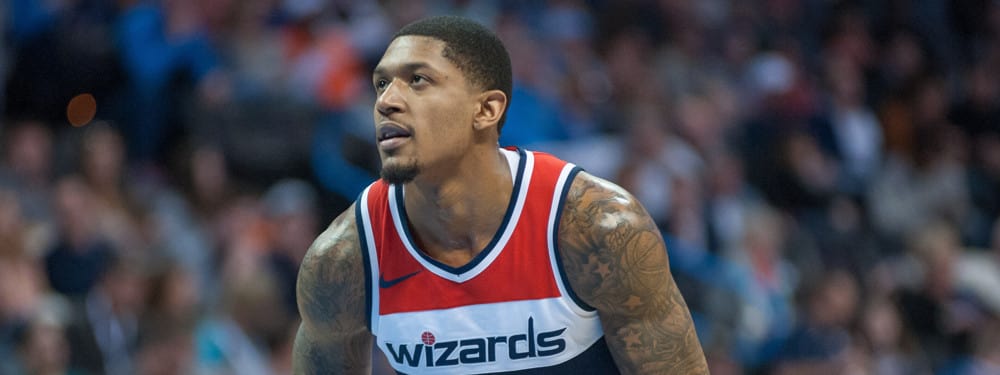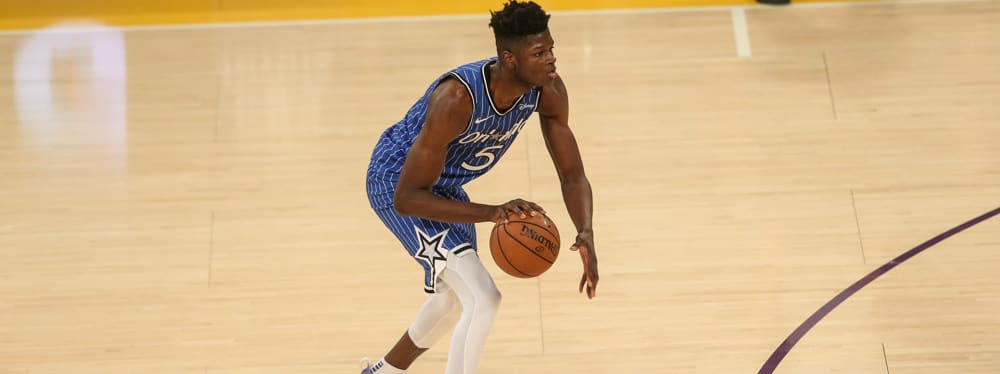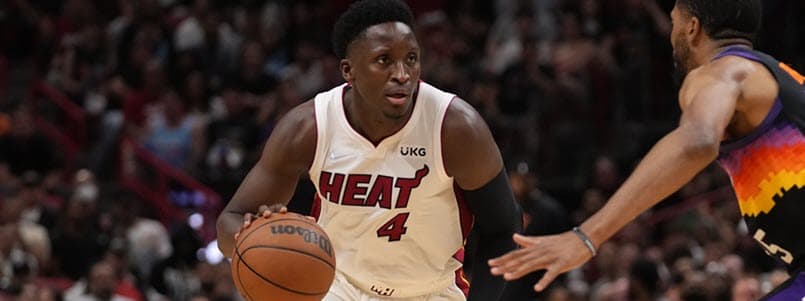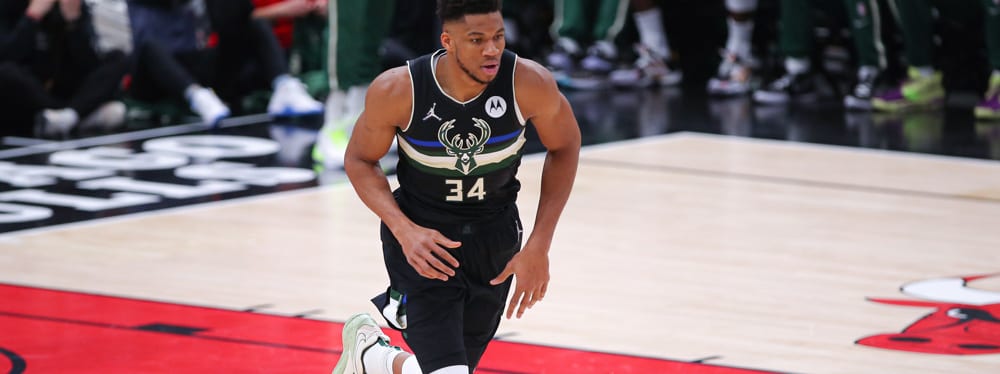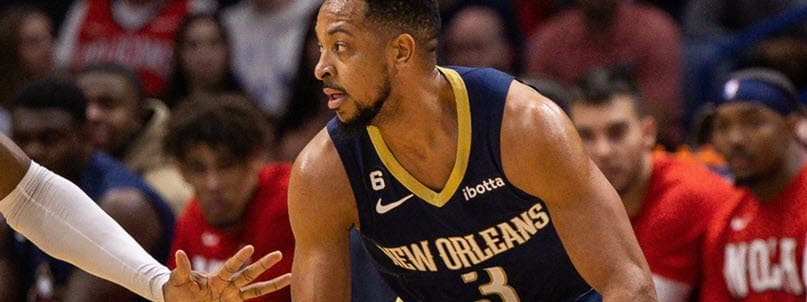Recent RotoWire Articles Featuring George Hill
See More
Hill logged just 54 games during the 2021-22 season, a sign that age is certainly catching up with him. Missed games have been a recurring issue over the past few seasons, limiting his opportunities significantly. The Bucks will again be pressing for an NBA title, meaning the veteran guard will be given plenty of time to rest. Even in 25 minutes per game, Hill has proven unable to fill the box score, meaning even managers in deeper formats would be better served to take a flier on a young player with more upside.
Since 2016-17, Hill has played for Utah, Cleveland, Sacramento, Milwaukee, Oklahoma City and Philadelphia. Over the past three seasons, he's averaged 8.6 points, 2.6 assists and 2.5 rebounds in 21.9 minutes. It seems likely we can expect similar numbers again from him during his second stint in Milwaukee. Hill is lined up to be the Bucks' backup point guard behind Jrue Holiday, and the two could spend some time on the court together, as well. However, the Bucks revamped their depth in the offseason, adding Grayson Allen and Rodney Hood, so Hill will have some competition when trying to find minutes at shooting guard. Ultimately, Hill will likely only be fantasy relevant in deep leagues.
Hill started just two games last season but played a significant part in the Bucks' rotation, averaging 21.5 minutes per game, up slightly from the 20.4 minutes per game he managed after his midseason trade to Milwaukee the season prior. His production improved noticeably, as he scored just 6.8 points per game after his move to the Bucks in 2018-19 but scored 9.4 last season. His usage rate jumped by just a small amount, from 14.4 percent to 15.5 percent, but his effectiveness improved massively, particularly from beyond the arc, where he shot a career-best and league-best 46.0 percent after shooting just 28.0 percent during his first partial season with the Bucks. He also increased his assists per game from 2.1 to 3.1. However, during the offseason, Hill was dealt to the Thunder. It looks like he could start for the rebuilding team, but it doesn't seem like his minutes and usage will be a priority. Optimistically, Hill could be worth a late-round flier, but it would take the 34-year-old seeing roughly 30 minutes per night for that selection to pay off.
Hill was traded to the Bucks in early December as the Bucks looked to dump salary and gain veteran talent in the backcourt. Appearing in 47 games with Milwaukee, Hill saw 20.4 minutes per game and averaged 6.8 points on 5.7 shots, 2.6 rebounds and 2.1 assists. While that was a relatively small role, it's possible Hill will see his workload expand this season considering the departure of Malcolm Brogdon. The Bucks loaded up on shooting guard options like Wesley Matthews and Kyle Korver, but now Eric Bledsoe and Hill are Milwaukee's only two backcourt playmakers. It would be surprising if Hill found himself with standard fantasy league relevance, but owners in deep leagues could consider the veteran with the final pick in a draft.
After a strong couple of seasons in Indiana and Utah, Hill was a hot commodity on the free agent market in the summer of 2017. One of the teams with the most cap space available, the Kings, ended up signing him to a three-year, $57 million contract. Hill wound up playing in 43 games in Sacramento, but averaged just 10.3 points, 2.7 rebounds, 2.8 assists and 1.3 three-pointers across 26.6 minutes. The team was in a rebuild and often turned to their younger talent for more developmental opportunities. As a result, Hill was shopped at the trade deadline and was ultimately dealt to Cleveland, where he was expected to come in and provide a two-way threat to help LeBron James make another run to the NBA Finals. While that feat was accomplished, Hill's numbers didn't improve much, if at all, while playing alongside such a high usage player and he ended up averaging just 9.4 points, 2.7 rebounds, 2.8 assists and 1.1 three-pointers across 27.9 minutes in 24 games. With James opting to leave Cleveland in favor of Los Angeles this offseason, Hill could see his usage climb a bit. Look for him to open the season as the starting point guard, with his defensive prowess and three-point shooting being especially beneficial -- Hill shot 41.5 percent from deep in 2017-18. Still, the Cavaliers drafted electric point guard Collin Sexton with the eighth overall pick in the 2018 Draft and also bring back Jordan Clarkson, both of whom could limit Hill to just minor gains overall. Sexton is likely the bigger threat overall and if he plays well early on as a rookie, he could cut into Hill's workload.
Hill inked a three-year, $57 million deal with the Kings in the offseason – a highly unanticipated move – after spending just one year in Utah as a result of being dealt there by Indiana. While it was largely assumed the Kings would essentially stand pat with their youthful roster, rolling the ball out with a handful of guys under legal drinking age in a rebuilding effort, the team went ahead and signed the 31-year-old veteran point guard. While it’s unclear at the moment whether coach Dave Joerger intends to play Hill at full-time point guard or at shooting guard next to rookie point-guard De’Aaron Fox for large stretches, it seems safe to assume that Hill will likely garner a similar workload to the 31.5 minutes per game he saw last year. In those minutes, Hill posted 16.9 points, 4.2 assists, 3.4 rebounds and 1.0 steal while shooting 47.7 percent from the field. He also continued his work as a floor spacer, drilling 1.9 threes per game at a 40.3 percent clip. In addition, Hill projects to be the best player on the floor most of the time – a role he hasn’t taken on over the past few seasons due to playing alongside both Paul George and Gordon Hayward respectively. As a result, Hill will likely see his usage rate increase, which generally results in higher counting stats.
After cycling through three different point guards (Raul Neto, Trey Burke and Shelvin Mack) to varying degrees of success last season, the Jazz wasted little time in the offseason in adding stability to the position, acquiring Hill from the Pacers prior to the 2016 NBA Draft while surrendering the 12th overall pick. The 30-year-old’s tight perimeter defense and ability to knock down three-point shots makes him an ideal fit in Utah, but in the fantasy realm, he’ll likely remain overshadowed by many of the other starting point guards around the league. Over 74 appearances for the Pacers last season, Hill averaged 12.1 points, 4.0 rebounds, 3.5 assists, 1.7 three-pointers and 1.1 steals in 34.1 minutes per game last season, numbers that while useful, don’t exactly make him an exciting commodity. Hill at least helps his cause by delivering strong percentages across the board, but look for his playing time to take a slight dip in 2016-17 with Dante Exum, the No. 5 overall pick in 2014, set to return this season after missing all of 2014-15 with a torn ACL. Exum is viewed as the Jazz’s long-term option at point guard, but due to his lack of NBA experience along with the team’s desire to contend this season, Hill was brought in to take some of the pressure off the 21-year-old from Australia. Hill is thus expected to stick in the starting five all season, but he’ll likely head elsewhere next summer when he becomes a free agent, as Exum should be ready to take the starting point guard title by that time.
The 29-year-old Hill returns to Indiana for his fifth year in Indiana and his eighth year in the Association. The veteran point guard looks to shake last year's injury bug. Knee, quad, and groin issues forced Hill to miss 39 games last year. But he returned late in the season to produce career highs of 16.1 points, 5.1 assists, and 4.2 rebounds per game. For 2015-16, expect Hill to return closer to his career averages of 11.2 points, 3.2 assists, and 3.1 rebounds per game as new arrival Monta Ellis will certainly eat into Hill's scoring opportunities. Still, Indiana has many defense-first players in their rotation, leaving opportunities for Hill to continue to shine. And if Indiana does pick up the pace, as many expect, there will be more shots for everyone. Hill makes for a reliable second point guard for most fantasy squads, especially if he continues to drain 1.6 three-pointers per game, as he did last year.
Hill took a step back in 2013-14, as his scoring average dipped from 14.7 points to 10.3, and his assist average fell from 4.7 assists to 3.5. Even though Hill lines up as the point guard in nearly every offensive set for the Pacers, his former teammate Lance Stephenson ended up leading the team in assists last season, averaging 4.2 helpers per game. With the Pacers losing Stephenson to free agency, as well as losing leading scorer Paul George to injury this offseason, Hill is primed for an increase in production. Hill views himself as more of a shooting guard than a point guard, but he'll once again be responsible for getting the ball up the court and setting up David West and Roy Hibbert, both of whom expect to be main cogs in the team's offense in 2014-15. He represents a sneaky fantasy value this season and could see a big increase in possessions this season, but owners will need to bolster their assist production through other means if they want to stay competitive in that category with Hill on their team.
Last season was George Hill's first as the Pacers' full-time point guard, and he rose to the challenge, posting career-bests in scoring (14.2 ppg), assists (4.7), rebounds (3.7) and steals (1.1) in a career-high 35 minutes per game, while also stepping up to give the team some perimeter scoring to replace Danny Granger's contributions. Though he's firmly established now as Frank Vogel's "coach on the floor," he may have a difficult time replicating those numbers in 2013-14, mostly because the Pacers will have a lot more scoring options – including the returning Granger and underrated backup point guard C.J. Watson. Another thing to consider – though Hill's listed position is point guard, his statistics are more what you'd get from a two. Look elsewhere for big assist numbers.
Hill struggled early on as the Pacers’ third guard, and it wasn’t until March that he started to get comfortable with his new team. Soon after, Darren Collison went down with an injury and Hill became the starting point guard and never relinquished the job. The Pacers had better chemistry with him in charge. The organization was happy enough to hand him a five-year, $40 million contract, and ship Collison to Dallas. As a point guard, Hill’s been a better scorer than playmaker, so make sure your fantasy roster has another capable assist man. On the other hand, this will be the first time in Hill’s career he’s been handed a full-time starting job as a point guard.
A draft-night trade to Indiana should mean a big boost to Hill’s fantasy value this season. Instead of backing up Tony Parker and Manu Ginobili in San Antonio, he’ll most likely be sharing the backcourt with Darren Collison, solidifying the Pacers’ starting shooting guard spot that’s been in flux for years. Hill has been very effective as a fill-in to this point, averaging 14.8 points, 3.2 rebounds, 3.6 assists and 0.8 steals per game in 55 career starts. There’s no reason to believe his game won’t translate as he takes on a bigger role on a full-time basis. It’s not clear how the Pacers will use him, but it’s not hard to envision Hill as a Manu Ginobili-lite; a player that can look to score when needed or initiate the offense from the two spot at times.
The selection of Hill – an unheralded guard out of obscure Indiana University-Purdue University Indianapolis (IUPUI to friends) on draft night 2008 had fans and pundits alike diving for their notes. But as we've learned over the years, "Never question a Spur draft pick." Since that night, Hill has developed into a major contributor in coach Gregg Popovic's rotation, displacing Roger Mason last season and possibly eating into Tony Parker's playing time this year. Hill lacks Parker's quickness – most humans do – but he has a respectable outside shot (just under 40 percent from three) that gives San Antonio's offense another long-range threat when he's on the floor. Even if he doesn't seriously cut into Parker's minutes this season, he could have fantasy value as a bench player, especially if Manu Ginobili gets hurt.
Hill is the primary backup to Parker at point guard, but he'll also see some time off the ball when Ginobili assumes the point duties. The numbers weren't impressive last season (5.7 points, 1.8 assists, 0.6 steals), but he demonstrated enough as a rookie that he should be in line for a boost in playing time in his second year. As long as Parker is healthy, however, his fantasy value will be negligible.
Hill was somewhat of a surprise pick for the Spurs in the first round of I.U.P.U.I., but the Spurs like his versatility and his ability to score. Hill is expected to play both guard positions for the Spurs. Hill struggled with his shot in the summer league, so it may take Hill awhile to get adjusted to life in the NBA.
Hill was somewhat of a surprise pick for the Spurs in the first round of I.U.P.U.I., but the Spurs like his versatility and his ability to score. Hill is expected to play both guard positions for the Spurs. Hill struggled with his shot in the summer league, so it may take Hill awhile to get adjusted to life in the NBA.
